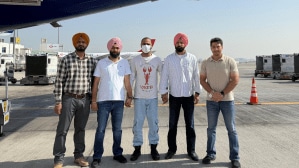Supplies roll into Kathmandu after Delhi-backed plan hits the ground
On Saturday night, under a tight security cover thrown by the Royal Nepalese Army (RNA), 10 trucks loaded with essential commodities quietly...

On Saturday night, under a tight security cover thrown by the Royal Nepalese Army (RNA), 10 trucks loaded with essential commodities quietly slipped into the Capital Valley. On Sunday evening, 60 trucks followed, with vegetables, petro products and even goats.
Believed to have been driven by Indian drivers all the way from Raxaul, near the border, the convoys also set the wheels rolling on a New Delhi-backed plan to break the Maoist stranglehold on Kathmandu.
It also marked the first concrete step taken by the Nepalese government to tackle the crisis, in coordination with the Indian side, which discussed the issue at the Cabinet Committee of Security meeting on Saturday.
After four days of virtual inaction, the RNA has also deployed its Mi-17 helicopter gunships, Lancer helicopters and Advanced Light Helicopter Dhruv to protect the highways and provide aerial reconnaissance to supply convoys.
Besides reining in spiralling prices of commodities, the supplies are expected to pump up confidence in the disillusioned Nepali public. Finally, their government’s message is clear: the siege will not be allowed to succeed.
While Nepal has clarified that the trucks entering Kathmandu was a normal operation, it’s the timing and the route—through Maoist-infested areas in the Valley—that has startled many.
Meanwhile, Day Five of the Red blockade was marked by a bandh called by the Maoist Victims Association in Kathmandu and a peace rally by the Federation of Nepal Chambers of Commerce and Industry. On the other side, the Maoists are learnt to have hardened their stance by enforcing a bandh in Makwanpur, on Tribhuvan Raj Marg, and in Karve, on the Arkino highway to Tibet. The insurgents also attacked the district headquarters at Jhumla in western Nepal early on Sunday morning, gunning down one RNA soldier and taking several policemen as hostages. The Jhumla district headquarters building was razed, while leaflets asking residents to leave Ilam in Eastern Nepal were distributed as a run-up to the next attack.
The Maoist leadership has also asked three units in Nepalganj to shut down, including Sneha Hotel and Jagdamba Enterprises. But with New Delhi stepping into help Nepal break the blockade, and the world watching, the Maoists are under pressure to negotiate or lose credibility. Chances are the coming week will see the first moves in the end game in the Himalayan kingdom’s latest crisis.






- 01
- 02
- 03
- 04
- 05

























